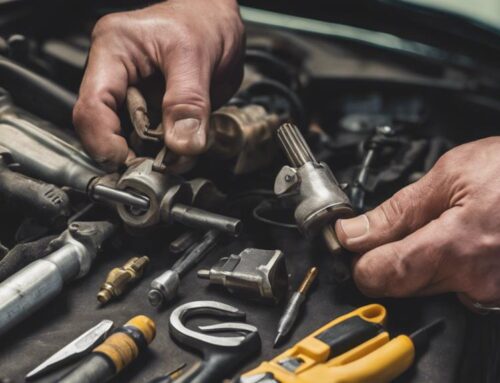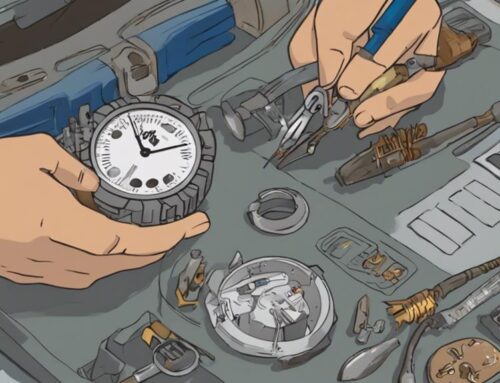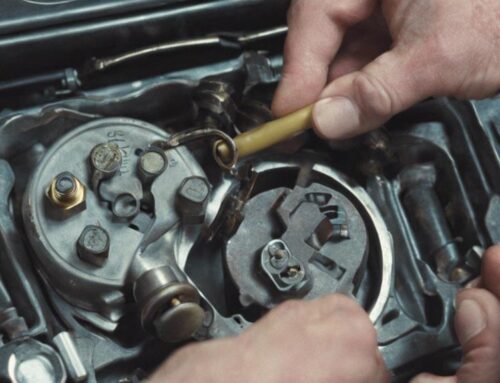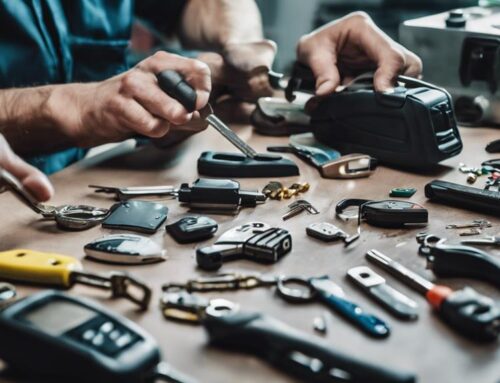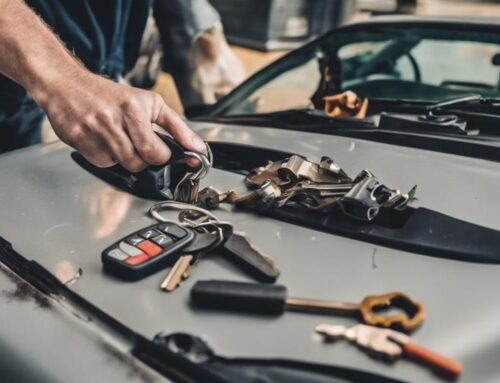Imagine you're late for work, and your car refuses to start because the ignition switch fails to engage. This frustrating scenario often stems from common issues like electrical faults or worn components. You might be wondering what specific problems lead to such failures and how you can spot them before they become critical. Understanding these factors can not only save you time but also prevent costly repairs down the line. So, what are the key signs and causes you should be aware of to keep your vehicle running smoothly?
Key Takeaways
- Intermittent power loss and difficulty starting the engine are primary signs of ignition switch failure.
- Electrical issues, such as faulty wiring and corrosion, frequently disrupt ignition functionality.
- Mechanical wear and tear, including worn components and ignition cylinder malfunctions, can impede the ignition process.
- Loose wiring connections and deteriorated harnesses contribute to unstable electrical flow for ignition.
- Aftermarket accessories may overload the ignition system, leading to increased failure risks.
Signs of Ignition Switch Failure

When it comes to recognizing signs of ignition switch failure, you should be attentive to specific symptoms that can indicate a problem. Common ignition symptoms include intermittent loss of power to your vehicle's electrical systems, such as flickering lights or failure of dashboard indicators. You might also notice difficulty starting your engine or a complete lack of response when turning the key. Pay close attention to any unusual clicks or grinding noises, as these can serve as critical switch indicators. Additionally, if your vehicle stalls unexpectedly while driving, it's an urgent signal of potential ignition switch failure. Staying vigilant about these symptoms empowers you to address issues before they escalate, ensuring ideal performance from your vehicle's ignition system. Don't forget to take into account potential costs and time involved in repairing or replacing an ignition switch, as these factors can also impact the overall maintenance of your vehicle.
Common Electrical Issues
Ignition switch failure can lead to a range of common electrical issues that affect your vehicle's overall performance. One major concern is faulty wiring, which can disrupt the flow of electricity necessary for starting the engine and powering essential components. If you're experiencing intermittent power loss or dimming lights, your ignition switch may be compromised, causing erratic electrical signals. Additionally, circuit overload can occur when the ignition switch fails to manage the electrical load properly, potentially damaging other critical systems. This overload can manifest as blown fuses or burnt-out components, leading to costly repairs. Addressing these electrical issues promptly can enhance your vehicle's reliability and performance, ensuring you're in control on the road. Don't underestimate the power of a functioning ignition switch.
Worn Out Components

Worn out components in your ignition switch can lead to significant performance issues. Mechanical wear and tear, along with degraded electrical contacts, often result from prolonged use and exposure to environmental factors. Understanding these aspects will help you identify potential failures before they escalate. Additionally, regular maintenance and inspections can help prevent ignition switch failure caused by worn-out components.
Mechanical Wear and Tear
Mechanical wear and tear can greatly impact the functionality of your vehicle's ignition switch. Over time, components like tumblers, springs, and pins degrade due to constant use, leading to difficulty in turning the key or starting the engine. This deterioration is often a result of friction and stress, which can compromise the switch's performance. Implementing effective ignition troubleshooting techniques can help identify early signs of wear, allowing you to address issues before they escalate. Additionally, adopting preventative maintenance strategies, such as regular inspections and lubrication, can considerably extend the lifespan of your ignition switch. By proactively managing wear and tear, you not only enhance reliability but also guarantee ideal power delivery from your vehicle's ignition system.
For more information on maintaining your ignition switch, check out this helpful guide
Electrical Contact Issues
Over time, electrical contact issues can arise from the degradation of components within the ignition switch. Faulty relays often contribute to unreliable connections, leading to intermittent functionality. As these relays wear out, their ability to transmit electrical signals diminishes, causing erratic performance or complete failure. Additionally, corrosion buildup on contact points can severely impair conductivity, further complicating the ignition process. Corrosion not only obstructs the flow of electricity but can also create resistance that generates heat, potentially damaging surrounding components. Regular inspection and maintenance of the ignition system are vital to identifying these issues early. By addressing worn-out components promptly, you can guarantee peak performance and prolong the lifespan of your ignition switch. Locksmiths with expertise in ignition system repairs can assist in diagnosing and resolving these issues Can Locksmiths Fix Ignition Cylinders for Any Vehicle.
Environmental Factors Impacting Components
Environmental factors can greatly influence the integrity and performance of ignition switch components. Heat exposure can accelerate wear, causing critical parts to degrade faster than expected. Moisture damage not only leads to corrosion effects but also promotes electrical failures through short circuits. Dust accumulation hinders mechanical movement, while temperature fluctuations can stress materials, leading to cracks and eventual failure. Environmental stressors like pollution impact the switch's lifespan, introducing harmful contaminants that corrode connections. High humidity levels can exacerbate moisture damage, further compromising the system. To maintain peak performance, regular inspections are essential. By understanding these factors and recognizing the signs that your ignition cylinder needs attention, such as worn out components, you can take proactive measures to mitigate their effects and enhance the reliability of your ignition switch.
Key Damage and Wear
The ignition key plays an essential role in starting your vehicle, but repeated use can lead to key damage and wear. Over time, the metal can weaken, making it prone to bending or breaking. This wear can cause difficulty in turning the key, increasing the risk of ignition switch failure. Regularly inspect your key for signs of damage and consider key replacement options if you notice significant wear. To prolong the lifespan of your ignition key, implement ignition maintenance tips such as keeping the key clean and avoiding excessive force when turning it. By addressing key damage proactively and following Essential Tips for Ignition System Care and Maintenance, you can guarantee a reliable ignition system and maintain the power of your vehicle's operation.
Loose Wiring Connections
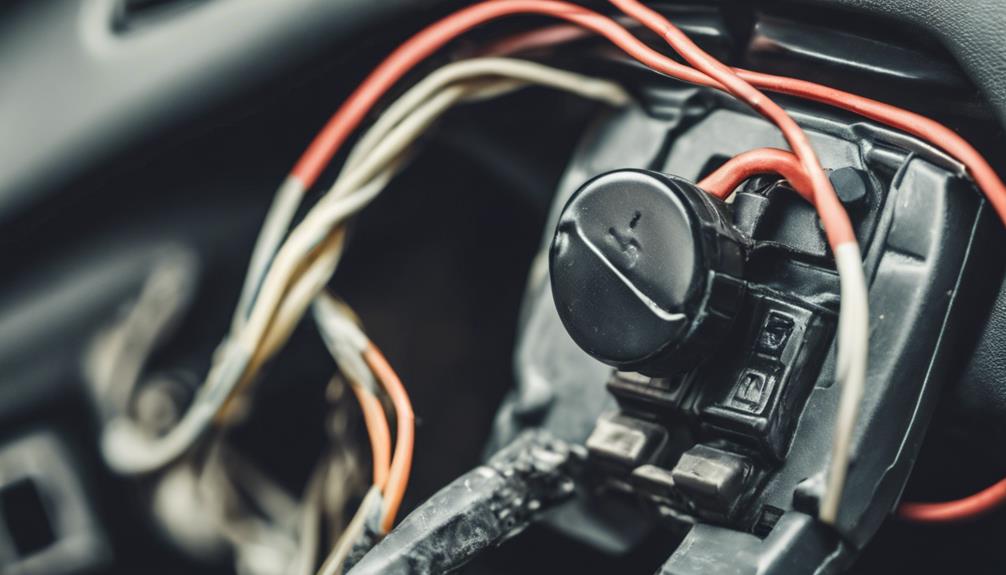
Key damage isn't the only factor that can lead to ignition switch failure; loose wiring connections can also play a significant role. When the wiring harness deteriorates or becomes dislodged, it compromises connection stability, which can disrupt the electrical flow necessary for ignition. This instability can manifest as intermittent starting issues or complete failure to start. You might overlook visual inspection, but checking the wiring harness for frayed wires or loose connectors is essential. Confirming all connections are secure can prevent costly repairs and enhance your vehicle's performance. Don't underestimate the importance of maintaining tight connections; doing so safeguards your ignition system and guarantees reliability in every ignition cycle. Additionally, regular maintenance and inspections by a qualified locksmith can help identify and address wiring issues before they escalate.
Environmental Factors
Weather conditions and exposure to elements can greatly impact the longevity and functionality of ignition switches. Temperature extremes can cause materials to expand or contract, leading to misalignment and eventual failure. Similarly, moisture exposure can promote corrosion and short-circuiting, undermining the switch's reliability. Understanding these environmental factors is vital for ensuring ideal performance.
| Environmental Factor | Impact on Ignition Switch |
|---|---|
| Temperature Extremes | Causes material expansion/contraction |
| Moisture Exposure | Leads to corrosion and short-circuiting |
| High Humidity | Increases risk of electrical failure |
| Dust and Debris | Impedes proper operation and alignment |
Ignition Cylinder Malfunctions
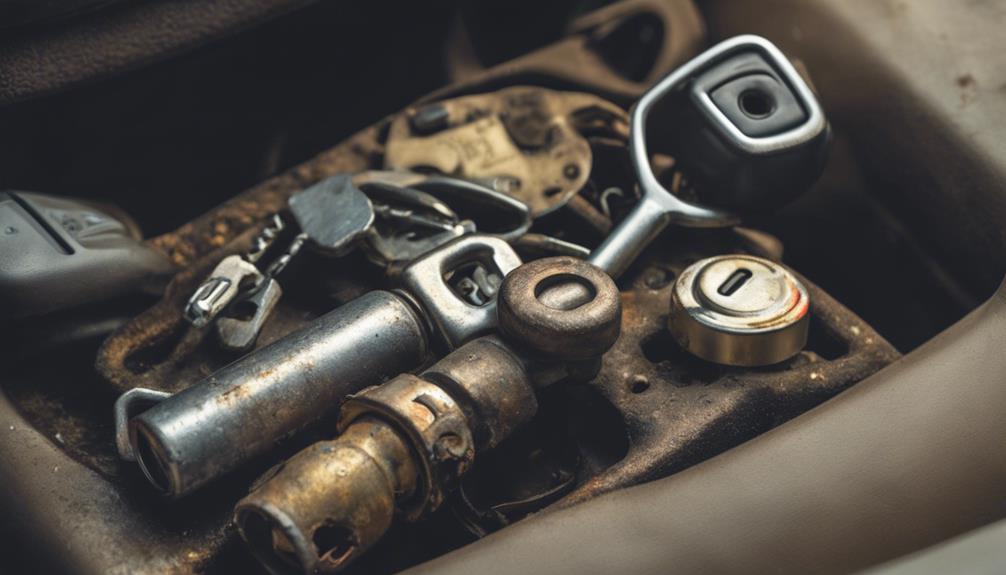
Ignition cylinder malfunctions often stem from wear and tear over time, which can compromise its functionality. You may also encounter electrical connection issues that disrupt the signal between the ignition cylinder and the switch. Understanding these problems is essential for effective troubleshooting and maintenance. Additionally, knowing the benefits of repairing an ignition switch versus replacing it can help guide your decision-making process Repairing vs. Replacing Your Ignition Switch: What to Know.
Wear and Tear
Over time, the ignition cylinder can suffer from significant wear and tear, leading to malfunctions that disrupt vehicle operation. Understanding the impact of this deterioration is essential for maintaining your ignition switch lifespan. Preventive maintenance can mitigate these issues, but neglecting it can result in:
- Reduced responsiveness when turning the key
- Difficulty in starting your engine
- Inconsistent electrical connections leading to stalling
- Potential complete ignition failure
These problems not only compromise your vehicle's reliability but can also pose safety risks. Regular inspections and timely replacements will empower you to maintain peak performance. Don't underestimate the importance of a robust ignition system—stay proactive and protect your investment. Additionally, staying informed about the costs and time factors involved in ignition cylinder repair can help you make informed decisions regarding your vehicle maintenance.
Electrical Connection Issues
Reliability hinges on the integrity of electrical connections within the ignition cylinder. If you experience ignition problems, connection corrosion may be a primary culprit. Faulty ignition wiring can disrupt the flow of electricity, leading to malfunctioning components. Here's a quick overview of common issues:
| Issue | Cause | Effect |
|---|---|---|
| Connection Corrosion | Moisture exposure | Intermittent starting |
| Loose Connections | Vibration or wear | Complete ignition failure |
| Faulty Wiring | Age or damage | Inconsistent electrical signal |
To maintain peak performance, regularly inspect the ignition wiring and connections. Neglecting these elements can lead to significant power loss and reliability issues, ultimately hindering your vehicle's performance.
Aftermarket Accessories Impact
When you install aftermarket accessories in your vehicle, you might inadvertently affect the ignition switch's performance. The aftermarket impact can lead to accessory overload, straining your vehicle's electrical system and compromising ignition functionality. Here are four critical issues to take into account:
- Increased Current Draw: High-demand accessories can draw more power than your ignition system can handle.
- Voltage Drops: Excessive accessories can cause voltage drops, leading to unreliable ignition engagement.
- Overheating: Strain on the wiring can lead to overheating, risking failure of the ignition switch.
- Connection Failures: Additional accessories may lead to loose connections, increasing the risk of ignition issues.
Routine Maintenance Tips
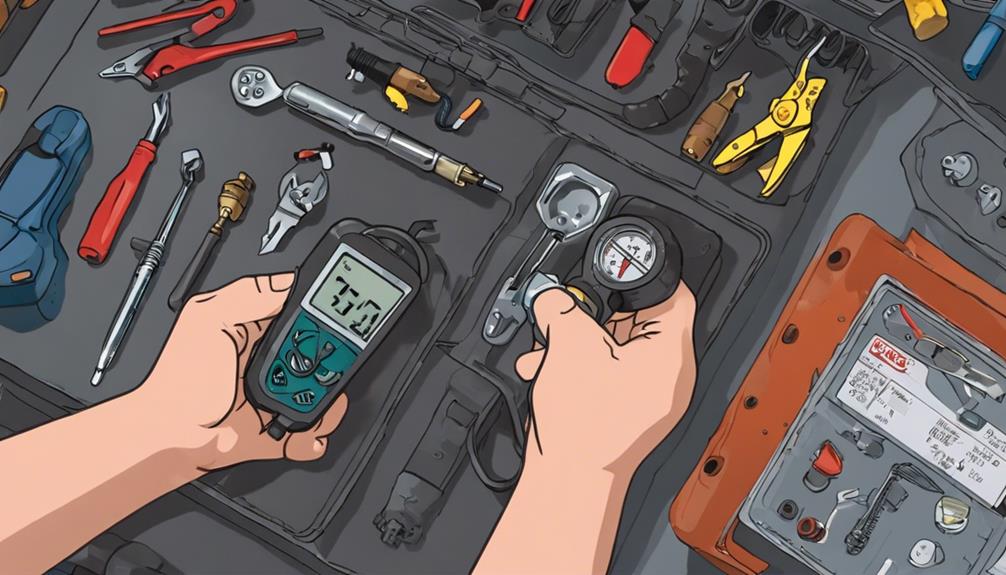
To prevent ignition switch failure, you should establish a regular inspection schedule for your vehicle's electrical components. Make it a habit to clean electrical contacts, as dirt and corrosion can impede performance. By maintaining these practices, you'll enhance the reliability of your ignition system.
Regular Inspection Schedule
Regular inspections of your vehicle's ignition switch are essential to guarantee ideal performance and prevent unexpected failures. A structured preventive maintenance routine can greatly extend the life of your ignition system. Here's an inspection checklist to guide you:
- Check for wear: Look for signs of physical damage or excessive wear on the switch.
- Test functionality: Confirm the ignition switch operates smoothly without hesitation.
- Inspect wiring: Examine the electrical connections for corrosion or loose fittings.
- Evaluate battery health: A weak battery can strain the ignition switch, leading to premature failure.
Clean Electrical Contacts
Maintaining clean electrical contacts is essential for guaranteeing your ignition switch functions effectively. Dirty or corroded contacts can lead to intermittent issues, reducing performance and reliability. Implementing proper cleaning techniques, such as using contact cleaner and a soft brush, can greatly enhance contact restoration. Be meticulous; verify all residues are removed to avoid future complications. Regularly inspect connections and apply dielectric grease to prevent moisture ingress and corrosion. This proactive approach not only extends the lifespan of your ignition switch but also optimizes its performance. You'll find that investing time in cleaning and maintaining these electrical contacts pays dividends in reliability and functionality, ultimately empowering your vehicle's performance. Stay vigilant in your routine maintenance to avoid ignition-related failures.
Role of Low Rate Locksmith
A low-rate locksmith plays an essential role in addressing ignition switch failure problems, especially when time and cost efficiency are paramount. When you encounter issues, consider the following benefits of utilizing locksmith services:
- Rapid Response: They can quickly assess and address your ignition problems, minimizing downtime.
- Affordable Solutions: Low-rate locksmiths offer competitive pricing for essential ignition solutions, saving you money.
- Expertise: They possess the technical skills needed to diagnose and repair ignition switch failures effectively.
- Convenience: Mobile locksmith services bring the expertise directly to your location, providing immediate assistance.
Choosing a low-rate locksmith guarantees you get reliable, efficient, and economical solutions to your ignition issues without sacrificing quality. Empower yourself with professional help when it matters most.



